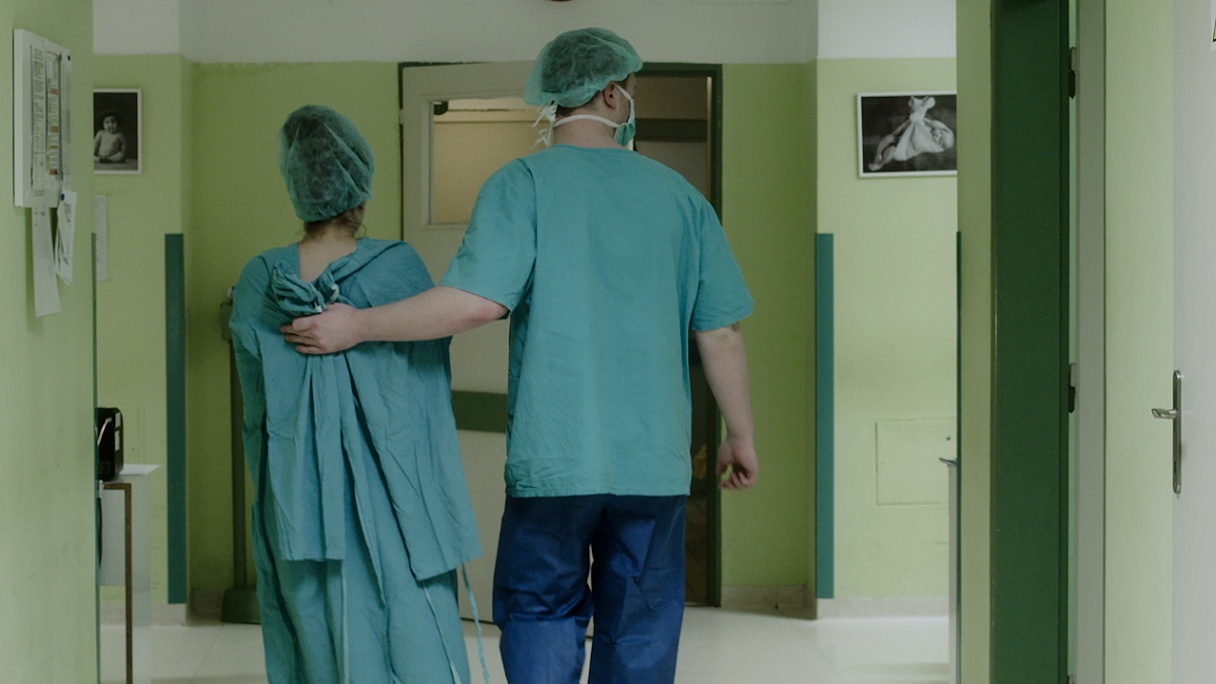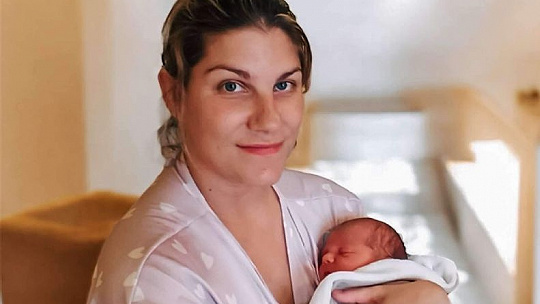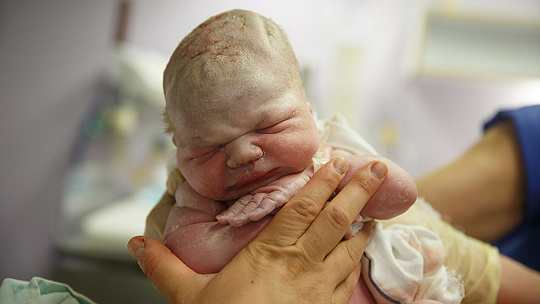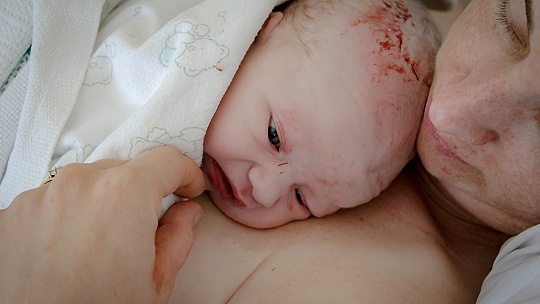
Každá intervencia pri pôrode by mala byť vykonaná len so súhlasom samotnej ženy.
Foto: Medzi namiO zákrokoch na našom tele rozhodujeme my... V tomto prípade žena ani nedostane šancu. Pozrite si ukážku z filmu Medzi nami:
Only We Ourselves Decide on the Interventions on Our body, a Lawyer Reminds from Selina Becker on Vimeo.
Zdravotnícky personál v ukážke vykonáva viaceré intervencie – vaginálne vyšetrenie, amniotómiu (prepichnutie vaku blán) a aplikáciu kanyly. Na žiadnu z nich si od rodiacej ženy nevypýtal informovaný súhlas. Pri amniotómii žena dokonca nedostala ani zrozumiteľnú informáciu o tom, že sa takýto zákrok ide udiať. Komunikácia lekára je autoritatívna a direktívna. Jej nerovnocennosť ešte zvýrazňuje fakt, že rodiaca žena počas nej leží v bolestiach s obnaženými rodidlami, a lekár, ktorý nad ňou stojí oblečený, má ruku v jej vagíne.Jedine rodiaca žena je oprávnená rozhodovať o tom, čo sa udeje s jej telom. Ani tá najminiatúrnejšia intervencia teda nesmie byť pri pôrode vykonaná bez toho, že by s ňou dotknutá žena súhlasila. Jej súhlas musí byť slobodný, nesmie byť získavaný nátlakom ani manipuláciou. Akékoľvek vyšetrenie, zákrok či podanie medikamentov môže nasledovať až potom, čo žena dostala dostatočné a zrozumiteľné informácie o účele a povahe navrhovanej intervencie, o jej benefitoch a rizikách, o alternatívach k nej, a po tom, čo mala dostatok času sa rozhodnúť.
Získavanie informovaného súhlasu nemožno redukovať na získanie podpisu rodiacej ženy na predtlačený formulár, ale musí ísť o proces, ktorý prebieha neustále v rámci rešpektujúcej, dôstojnej, efektívnej a empatickej komunikácie zo strany zdravotníckeho personálu. Takýto typ komunikácie odporúča aj Svetová zdravotnícka organizácia.
Mgr. Janka Debrecéniová, MJur., PhD., právnička zo združenia Občan, demokracia a zodpovednosť, editorka publikácií Ženy – Matky – Telá, www.odz.sk
Film Medzi nami je dostupný už aj na internete. Pozrieť online aj stiahnuť si ho môžete TU.
Vzdelávacie turné s filmom Medzi nami a expertkami môžete podporiť na StartLabe.
Publikáciu Ženy – Matky – Telá o právach žien pri pôrode si môžete stiahnuť bezplatne TU.
Vzdelávacie turné s filmom Medzi nami a expertkami môžete podporiť na StartLabe.
Only We Ourselves Decide on the Interventions on Our body, a Lawyer Reminds
How would our babies be born if best practice medicine were followed? Every day during the International Week for Respecting Childbirth we bring you an excerpt from our documentary Before I Met You, accompanied by expert commentary. Today, lawyer Janka Debrecéniová of the association Občan, demokracia a zodpovednosť (Citizen, Democracy, and Responsibility) writes about the fact that informed consent is not just a signed piece of paper.The medical staff in the video performed several interventions – vaginal examination, amniotomy (artificial rupture of membranes), and cannula application. None of them had asked for informed consent from the woman giving birth. In regards to amniotomy, the woman was not even provided clear information on that such a procedure was going to take place. The communication of the doctor was authoritative and directive. The inequality of the woman giving births was further highlighted by the fact that she was lying in pain with her genitals exposed during the conversation, while the dressed doctor was standing above her with his hand in her vagina.
Only a woman giving birth is entitled to decide what will happen to her body. Even the smallest intervention during the process cannot be performed without the agreement of the woman concerned. Her consent must be free and it must not be obtained by coercion or manipulation. Any examination, intervention or administering medication may only follow after the woman has been provided with sufficient and comprehensible information about the purpose and nature of the proposed intervention, its benefits, risks, and the alternatives to it, and after having had enough time to make decision.
Obtaining informed consent cannot be reduced to obtaining a signature of the woman giving birth on a pre-printed form; it must be a constantly undergoing process within respectful, dignified, effective, and empathic communication of medical staff. This type of communication is also recommended by the World Health Organization.
Mgr. Janka Debrecéniová, MJur., PhD., lawyer of the association Občan, demokracia a zodpovednosť (Citizen, Democracy, and Responsibility) and editor of the book Ženy – Matky – Telá (Women – Mothers – Bodies), www.odz.sk







